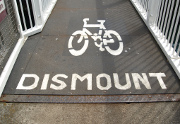 For those people that prefer to forego the full blown
DE and—instead of all the
“convenience” that this sort of setup offers—piece together their setup from a
variety of different tools and knit it all together with some scripting,
automounting external drives is, notwithstanding the inexplicable number of
posts to the forums to the contrary, incredibly straightforward with
udisks.
My approach in this respect is to use
udiskie; it is
lightweight, unobtrusive, configurable and foolproof, as far as I can tell.
For those people that prefer to forego the full blown
DE and—instead of all the
“convenience” that this sort of setup offers—piece together their setup from a
variety of different tools and knit it all together with some scripting,
automounting external drives is, notwithstanding the inexplicable number of
posts to the forums to the contrary, incredibly straightforward with
udisks.
My approach in this respect is to use
udiskie; it is
lightweight, unobtrusive, configurable and foolproof, as far as I can tell.
Where I have found a small gap, or more a minor irritation really, is with
unmounting devices. udiskie-umount /media/MY_USB_DRIVE works just fine, but
I often have a variety of media mounted, and not just standard
USB drives. At work, for
example, it is not uncommon for me to have mounted under
/media any or all of the following:
- A USB drive containing all of my music
- An encrypted volume mounted with tcplay shared via Bittorrent Sync
- A CIFS share
- An NFS share or an SSHFS mount.
In a couple of these cases, I don’t want to—or can't—just umount them with
udiskie; they require a different approach. To facilitate this, I have adopted
a simple approach: I use a standard naming convention for all external media
or their mountpoints. When I first buy a USB drive, I give it a meaningful name,
beginning with an uppercase letter, as this won’t clash with any of my internal
drives and it happily accommodates drives from other operating systems. So:
1
| |
sets up a new 8GB drive I found in the schwag bag at the conference I attended last week.
Now that all external media are predictably named, it is just a matter of writing a script that checks how many are mounted, presents a menu if there is more than one, and unmounts the respective device correctly:
1 2 3 4 5 6 7 8 9 10 11 12 13 14 15 16 17 18 19 20 21 22 23 24 25 26 27 28 29 30 31 32 33 34 35 36 37 38 39 40 41 42 43 44 45 46 47 48 49 50 51 52 53 54 55 56 57 58 59 | |
Now, no matter the number or type of devices I currently have mounted, I can
unmount them by typing dismount and choosing the appropriate drive via the
select menu. Simple, but satisfying. The script is in my
bitbucket repo
Notes
Creative Commons image, Dismount, by Chris.